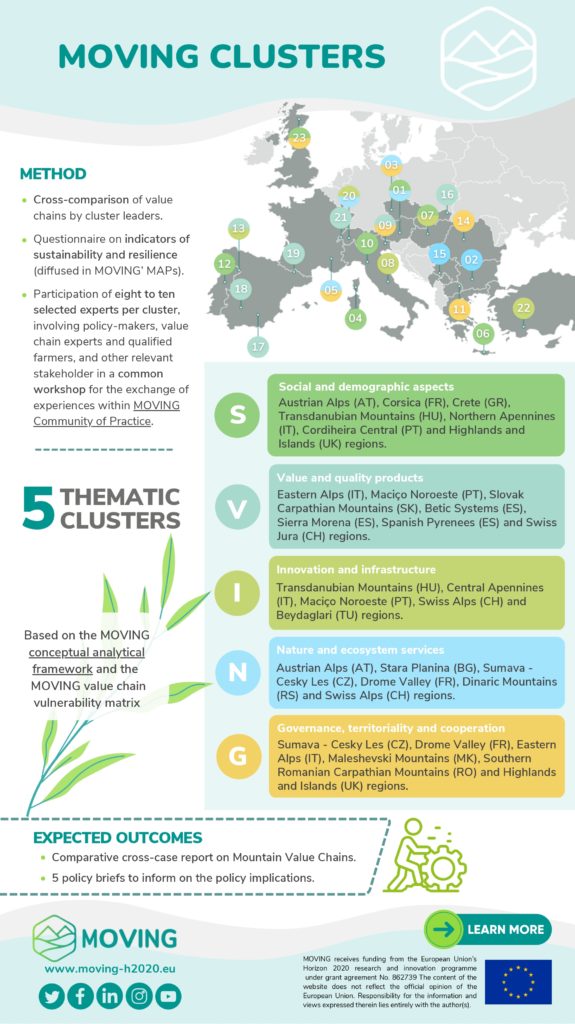
MOVING research activities and actions focus on 23 mountain regions from 16 countries, each one exploring a specific value chain.
From February 2023, those value chains, which have been studied in depth during the first two years of MOVING are grouped into five clusters:
- Social and demographic change (cluster S): led by the team from the University of Pisa, it deals with gender issues, the role of young people, depopulation, well-being, employment, social inclusion, new entrants and availability of labour.
- Value and quality products (Cluster V): led by the partners from VINIDEA, it deals with issues touching on geographical indications, food quality, traditional production, cultural heritage and local knowledge.
- Innovation and infrastructure (cluster I): it covers topics such as digitalisation and connectivity, high infrastructure costs, low investments, centralisation of services, digital skills, innovation and entrepreneurship. The cluster leader is the Zurich University of Applied Sciences.
- Nature and ecosystem services (Cluster N): The topics addressed by this cluster are landscapes, environmental protection, high nature value farming, regenerative and organic production, limits to growth and climate adaptation strategies. It is led by the team from the Czech University of Life Sciences in Prague.
- Governance, territoriality and cooperation (Cluster G): the James Hutton Institute is in charge of this cluster, which covers innovative governance forms, territorial integration, synergies and cooperation among value chains, interactions with tourism, institutional development, and dependence on subsidies or policies.

This clustering aims to develop a cross-regional benchmarking against vulnerability, sustainability and resilience criteria, focusing on the trade-offs between the provision of public and private goods in mountain areas.
Clusters have been made up in an iterative way and combining several approaches.
Firstly, the University of Cordoba, coordinating the project, interviewed a representative of each MOVING Reference Region to extract 23 variables representing challenges, success and failure factors in the value chains.
Then, the variables were grouped into five thematic clusters combined with the STEEPV framework, which was applied to do a clustering of European rural regions in POLIRURAL. The STEEPV acronym stands for 6 clusters – Social, Technological, Economic, Environmental, Political/policy and Values – but MOVING has adapted it to the specificities of the project.
Each cluster is composed of five to seven of the MOVING case study value chains. One of them is the cluster leader. Cluster leaders will valorise the work conducted in the in-depth analysis of the cases to develop cross-case analyses against vulnerability, resilience and sustainability criteria. Stakeholders will be involved by taking part in a questionnaire and participating in a common cluster workshop allowing stakeholders from all regions to meet in person and exchange for the first time.
AREPO will specifically be involved in cluster V on Value and quality products.

MOVING receives funding from the European Union’s Horizon 2020 research and innovation programme under grant agreement No. 862739.
The contents of this article do not reflect the official opinion of the European Union. The responsibility for the information and opinions expressed in it lies entirely with the author(s).










